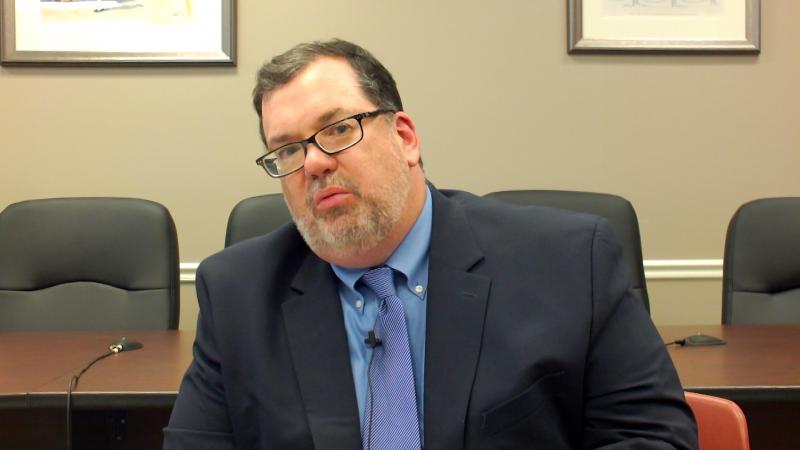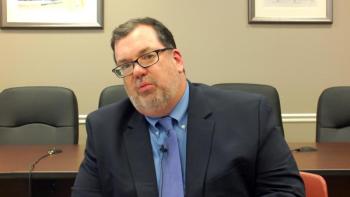Legal discussion held on upcoming marijuana vote
The Boothbay Harbor Board of Selectmen hosted a public educational session on marijuana through speaker Ted Kelleher on Thursday, Aug. 31. Kelleher — a Portland attorney who specializes in business, real estate, and regulated substances — has been become acquainted with the business and legal aspects of the rising industry which may find itself in Boothbay Harbor after a vote this November.
In April, Kelleher gave a slightly longer talk at the Boothbay Region YMCA about the legalization of cannabis and everything it entails — from the rules and laws currently in place, like the moratorium, down to the implications at the municipal level. Kelleher reprised this information, taking questions from the small crowd of just over a dozen audience members. He spoke on subjects ranging from rules on how many plants a dwelling can house to black market sales and federal law.
“The only limitation on marijuana that is going to come from the state is going to come from the local level. That makes local control of marijuana big … (But) the real specific rules are going to come out of the Bureau of Alcoholic Beverages. That’s going to take them something like six months to a year to accomplish and some of those rules have to be approved by the legislature.”
Kelleher said that after a bill in October and after the Bureau of Alcoholic Beverages begins drafting rules in November, “optimistically, it’s late spring, early summer of 2018 before the rules are done.”
“Then there’s a licensure process and then people have to grow the marijuana, get it into stores, and process it,” said Kelleher. “So we’re looking at the first retail sales of marijuana in Maine being late 2018 … possibly early 2019.”
Kelleher expanded on some of the state level lawmaking saying that one issue the Maine legislature will attempt to remedy is the number of plants a single dwelling can have. As it stands, anyone can grow up to six plants and anyone with a medical marijuana card can grow up to 12 plants. That means if there are, say, five medically dependent residents in a home, then there could potentially be 60 plants, and that is far more than can be legally, or plausibly, consumed personally, said Kelleher.
“They’re probably going to cap the number of plants that can be grown, either per dwelling unit or per parcel, at 12 plants,” said Kelleher. “The rule is going to be that if you have a parcel of land, you can grow 12 plants on it for personal use and that’s it.”
“Is there any way for them to monitor that in an apartment building?” asked Darrell Gudroe, consultant at Pharmer’s Market in Boothbay. “Which person loses their personal right to grow marijuana if they become the third person in the building?”
“That’s why I wonder how they’re going to define ‘parcel,’” answered Kelleher. “If they define it as ‘dwelling unit’ I think that makes more sense. I think there’s going to have to be some thought going into that, I agree.”
Asked whether or not black market operations would prevail in Boothbay Harbor if retail shops were not allowed, Kelleher said, “I think it depends on where else marijuana sales are available and what the appetite for marijuana in the town is. I tend to think that the black market issues are driven by bad regulations on the supply side versus at the state level than they are by anything that towns do. For instance, if Boothbay Harbor prohibits marijuana and there are vacationers coming in, there are almost certainly going to be places on Route 1 and Route 27 where they are able to buy it on their way in … My biggest concern would be on are you allowing people to grow so much marijuana that it incentivizes them to sell on the black market?”
Wendy Wolf, chairman of Boothbay Harbor’s board of selectmen, asked Kelleher to go into some detail on the issue of marijuana social clubs.
“The idea of social clubs is that it is a place where you can purchase marijuana on premises and consume it on premises the way you buy a beer in a bar and drink it in a bar,” said Kelleher. “It’s what’s commonly referred to as a hash bar or a marijuana bar.”
“The legislature got a lot of expressions of concern about them as a business model and one of the things they’re almost certain to do in their amended act is to delay any licensure of social clubs until June of 2019. I think the idea is ‘Let’s see how the rest of it goes and then we can think about social club licensure.’”
Denise Griffin, vice chair of the board, asked: “Can you speak to marijuana and marine boating use?”
“Federal law and marijuana do not mix well together. My advice to boaters would be ‘Don’t have marijuana on your boat’ because you’re subject to Coast Guard inspection and they’re not going to recognize the legality of possession of marijuana under Maine law and they’re probably, at a minimum, going to take your marijuana.”
Kate Marone, director for Healthy Lincoln County, brought forward the statistics for marijuana use in Lincoln County among minors. “As of 2015, they were reporting about 18 percent of our high school students in Lincoln County use marijuana on a regular basis ... About a quarter of our kids say they have tried marijuana at least once,” said Marone. “But a quarter of them say that they tried it before they were 13 years old.”
“Has the use (of marijuana) been tracked too?” asked Mike Tomko, board member.
“Yes,” replied Kelleher. “You’re able to draw a correlation between the point in time when it was legalized and when sales started for usage rates. One big question is ‘Are people more forthcoming about admitting use now that it is legal than they were in surveys prior to when it was legal?’ There’s a lot of hard stuff to tease out of that data.”
Kelleher has seen preliminary data showing that marijuana is effective at reducing opiate withdrawal symptoms. He said this is “probably a positive.”
“I think the punchline to that is, ‘Well, we have opiate addicts, maybe we can move them over to marijuana.’ They’re still going to be addicted to a substance, but it’s going to be a better substance socially and that’s a less bad outcome than what we have now.”
Ultimately, Kelleher said communities will have a set of big issues to face.
“… Are you going to prohibit marijuana altogether? If you don’t prohibit it are you going to limit the number of stores you allow … are you going to impose additional regulations like fire code, health safety, building code, signage issues? And are you going to impose your own local licensing requirements?”
Event Date
Address
United States


























